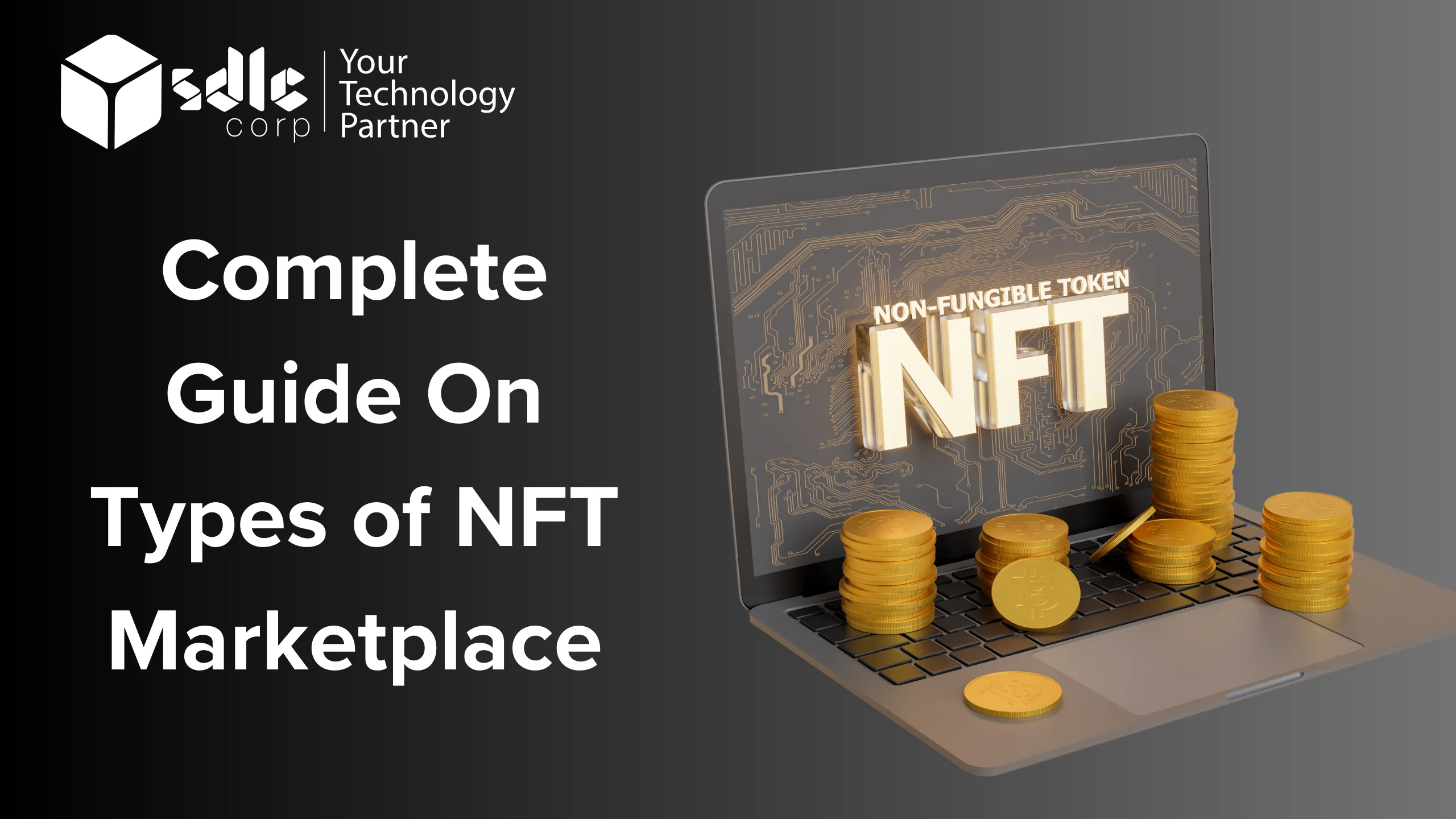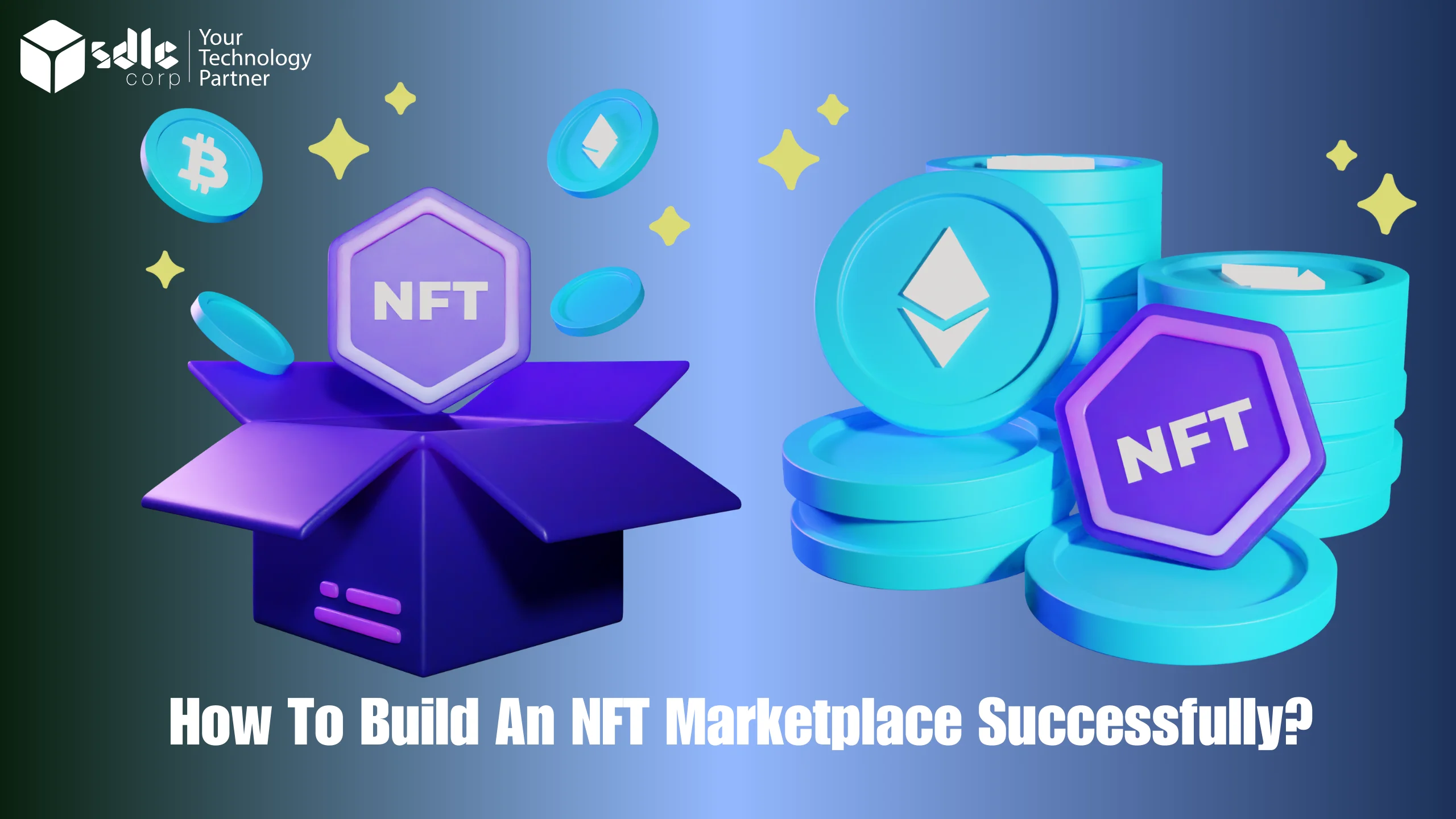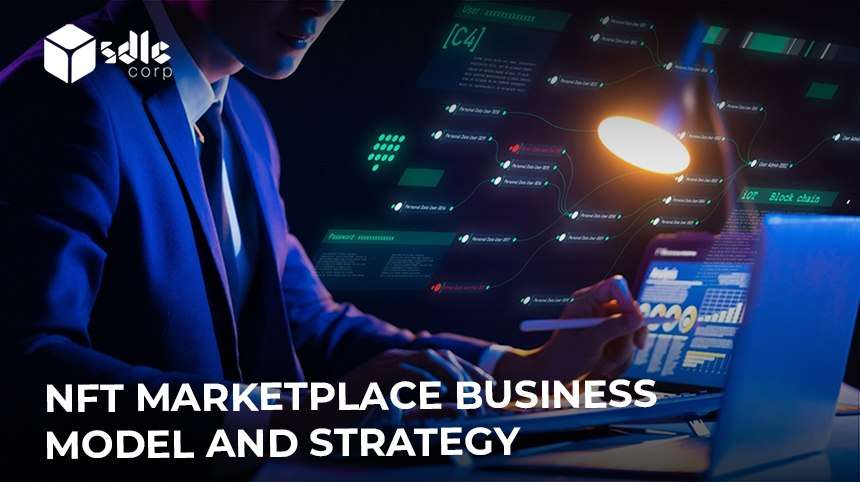Complete Guide on types of NFT Marketplace
Types of NFT Marketplace: NFTs are unique digital assets that are kept on a blockchain network. This gives buyers, sellers, and traders a safe way to buy, sell, and trade these digital assets. Because of this, NFT marketplaces have become a popular place for artists, collectors, and investors to buy and sell NFTs.
There are different kinds of NFT marketplaces for diverse segments and groups of people. Some marketplaces are made just for games, while others are equipped with art, music, or sports. Each type of NFT marketplace has its own set of features and benefits, so it’s important to know how they differ so you can figure out which one is best for a given use case.
In this article, we’ll talk about the different kinds of NFT marketplaces that are currently out there. These include marketplaces that focus on games, platforms that focus on art, platforms that focus on sports and entertainment, and hybrid marketplaces that serve more than one niche. We’ll look at the most important parts of each type of marketplace and discuss their pros and cons. By the end of this article, readers will know more about the different kinds of NFT marketplaces and how to choose the right one for their needs. (Read More about Everything You Need To Know Concerning The NFT Marketplace)
What Are the Different Types of NFT Marketplaces?
1. Curated NFT Marketplace
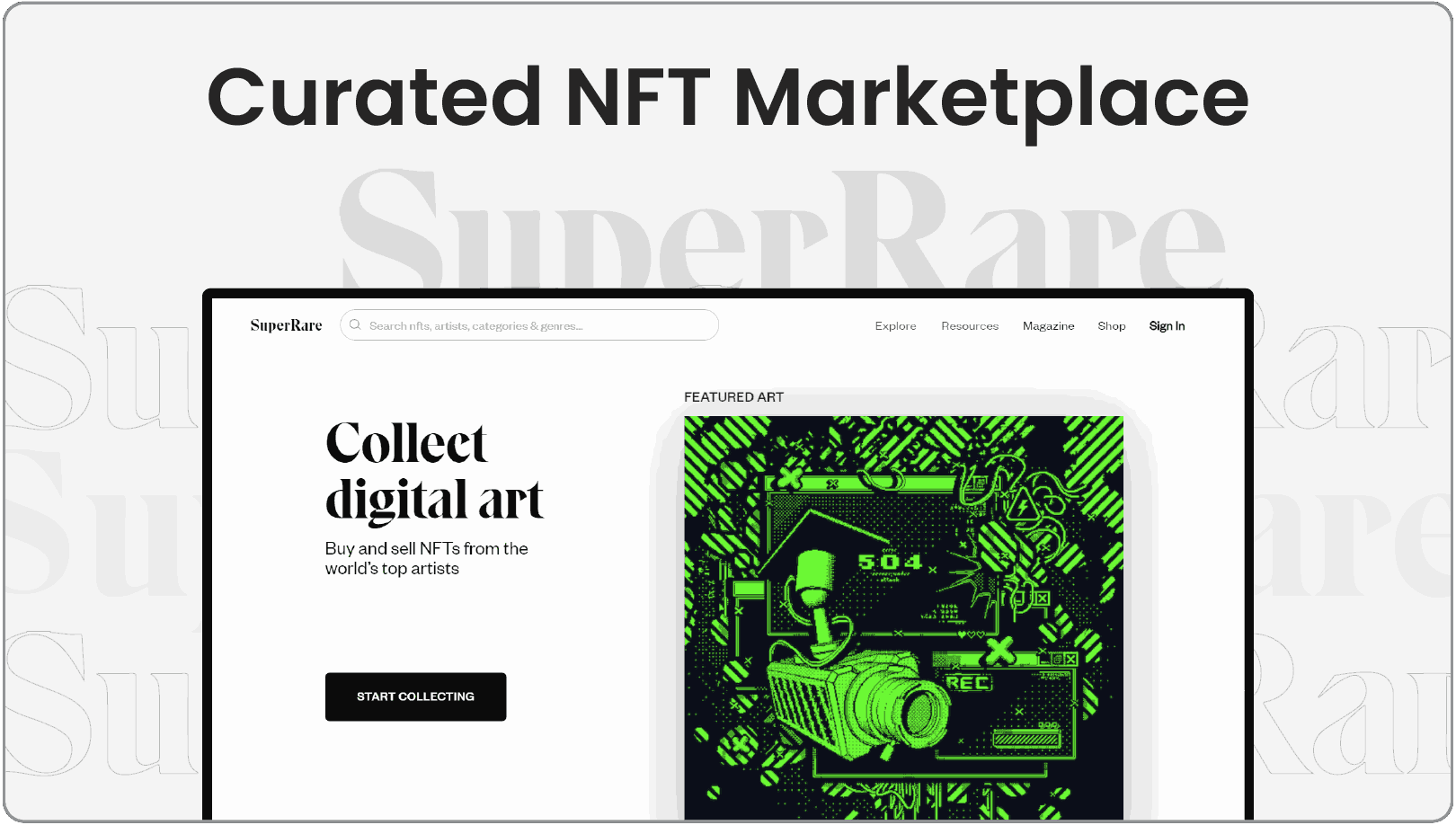
A curated NFT (non-fungible token) marketplace is an online platform that sells NFTs that have been carefully chosen and checked by a team of experts. NFT marketplaces give artists, creators, and collectors a place to show off their work and sell or buy NFTs.
A curated NFT marketplace is a marketplace which is curated by a team of experts who look at and choose each NFT based on certain criteria, such as quality, uniqueness, and how well it fits with the theme of the marketplace. The curation process makes sure that only the best NFTs are shown on the platform, which makes it easy for collectors to find what they want.
Curated NFT marketplaces are good for both sellers and buyers in several ways. A curated NFT marketplace can give sellers access to a large audience interested in their NFTs as well as a platform with high standards for quality and authenticity. This marketplace can give buyers peace of mind because they know the NFTs on the platform have been carefully chosen and checked. This reduces the probability that they will buy fake or low-quality NFTs.
Some curated NFT marketplaces may also offer extra services like NFT storage and authentication, which makes it easier for buyers and sellers to manage their NFT collections. Some curated NFT marketplaces may also have deals with artists, musicians, and other creators to sell NFTs that are only available on the platform.
Overall, curated NFT marketplaces do the NFT community a great service by giving them a safe place to buy and sell high-quality NFTs. As the number of people using NFTs keeps going up, curated NFT marketplaces are likely to become a bigger part.
Eg: SuperRare –
SuperRare is a curated NFT digital art market. They select and feature only artists who create original, high-quality works of art. SuperRare has a team of curators who evaluate each submission and accept approximately 10% of the submitted artworks. This ensures that only the finest content is featured on the platform. (Read More about NFT Art)
2. Open Marketplace
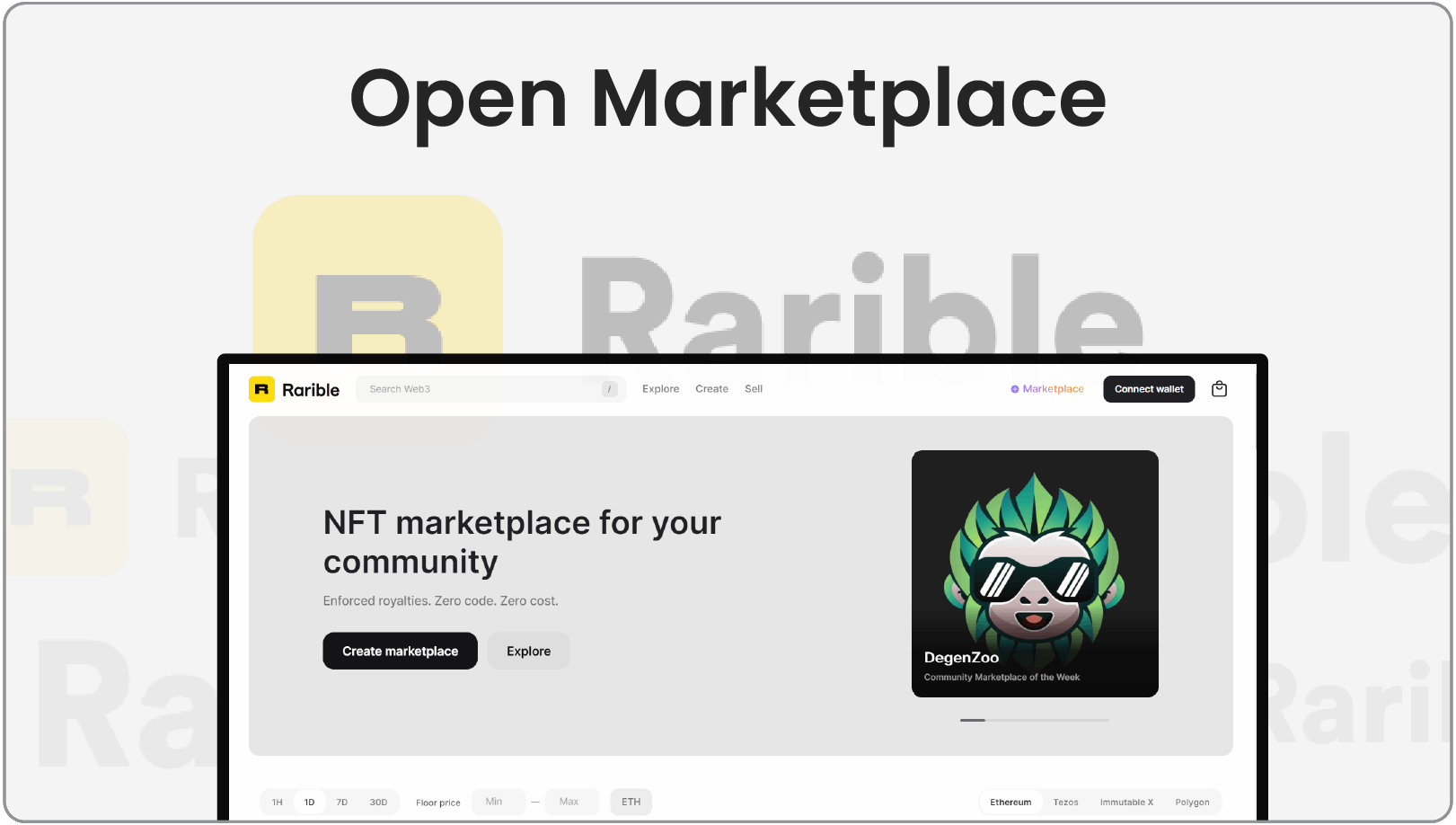
Open marketplaces don’t put any limitations on who can sell or buy NFTs. They frequently have a large selection of NFTs, but the quality can vary and it can be challenging to locate what you’re looking for.NFTs are cryptographic tokens that show ownership of a digital asset, like a piece of art, music, or other creative content. Open NFT Marketplaces like OpenSea, Rarible, and SuperRare are all good examples.
Open NFT Marketplaces work on a commission-based model, which means that the platform receives a portion of each transaction that goes through the site. In exchange, the platform gives buyers and sellers a safe, open marketplace where they can meet and do business without the help of middlemen. Open NFT Marketplaces also have search filters, reviews, and ratings, as well as payment and shipping options that are built in. These features make transactions easier and improve the user experience.
Open NFT Marketplaces are good for creators, collectors, and investors in a number of ways. NFTs give creators a new way to make money from their digital content and reach people worldwide without the necessity for middlemen or gatekeepers. NFTs also give creators a unique chance to keep ownership and control of their work, as well as to keep getting royalties from sales of their work in the future. NFTs give collectors and investors a new type of asset that could go up in value and add variety to their portfolios.
One of the most important things about Open NFT Marketplaces is that they are open. Open NFT Marketplaces let anyone create and list NFTs, as long as they meet certain requirements. Closed NFT Marketplaces only let certain artists or collectors use them (such as quality standards and legal compliance). This makes it fair for creators to compete, encourages diversity and new ideas, and gives collectors and investors more choices and options.
But Open NFT Marketplaces also have some problems since they’re open. Because there are so many NFTs, it can be hard for buyers to find what they want and make smart decisions about what to buy. Also, problems like fake listings, fake reviews, and bad customer service are common in Open NFT Marketplaces. In order to deal with these problems, many Open NFT Marketplaces have put in place rules and tools to protect buyers and keep the platform’s integrity.
Overall, Open NFT Marketplaces are a useful tool for creators, collectors, and investors alike. By giving anyone a place to make and trade unique digital assets, these platforms make a marketplace that is full of activity and benefits everyone. As the NFT market grows and changes, Open NFT Marketplaces are likely to become more important to the economy and the way we think about ownership and value in the digital age.
Eg: Rarible –
Rarible is a Open NFT Marketplace that enables creators to mint and sell their own NFTs. It provides a place for artists and collectors to exhibit their work and for purchasers to locate rare and valuable non-fungible tokens. Additionally, Rarible offers a governance token that enables holders to participate in platform decision-making.
Launch NFT Marketplace App Just @ $5000

Comparison Between Curated NFT Marketplace & Open Marketplace
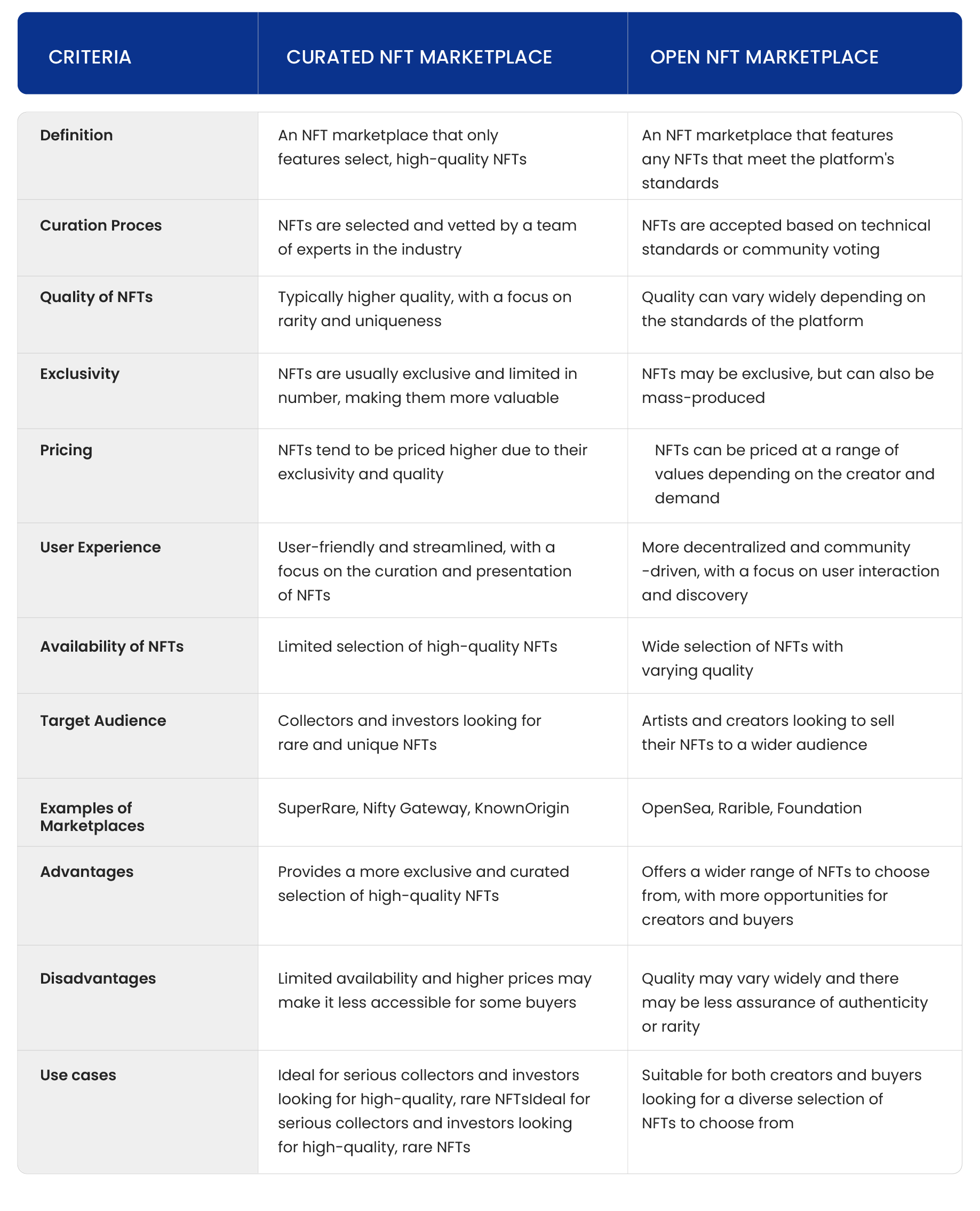
3. Hybrid NFT Marketplaces
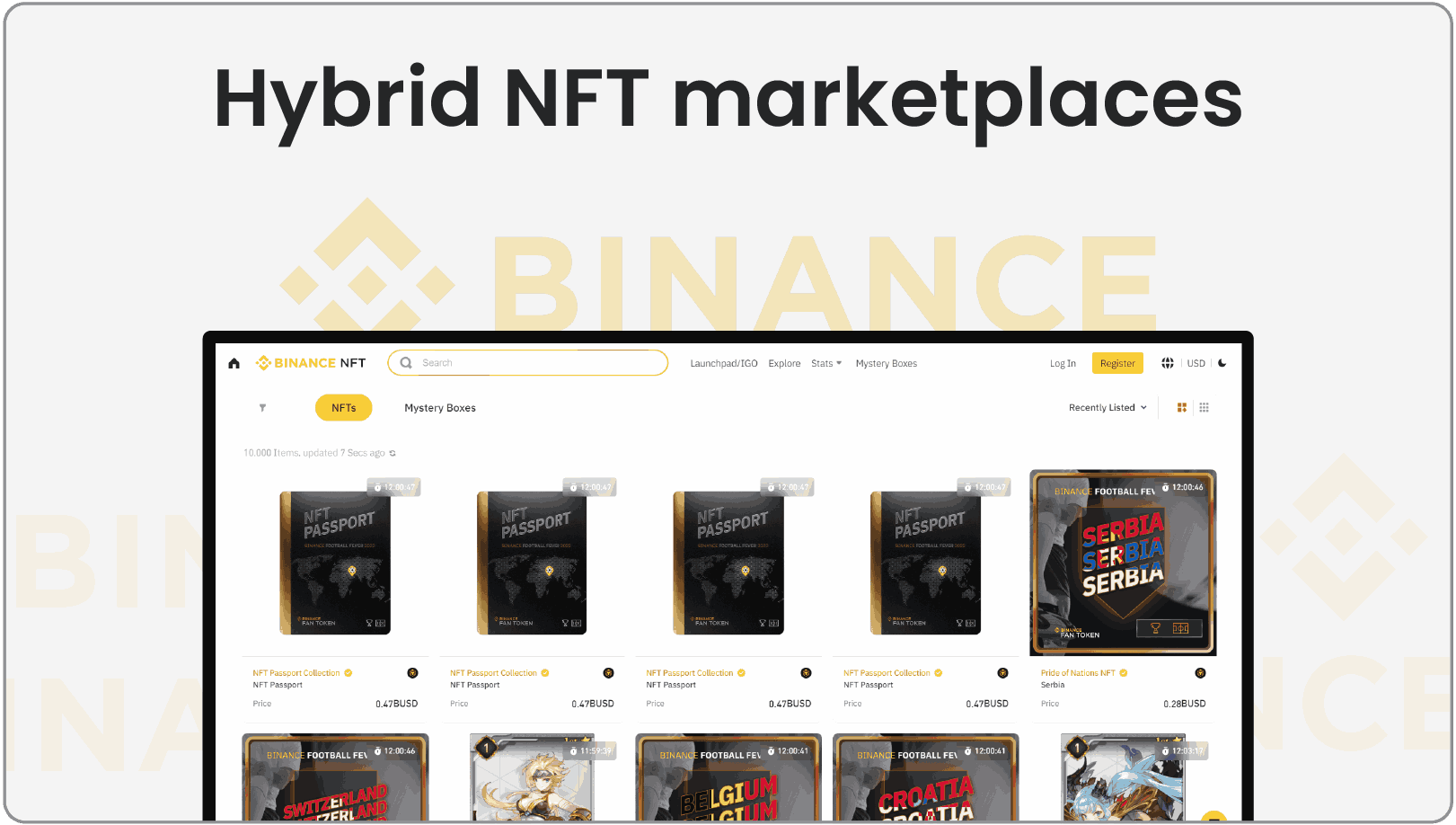
Hybrid NFT marketplaces offer both curated selections of high-quality NFTs and a wider variety of NFTs that anyone can sell, combining aspects of both curated and open marketplaces. These platforms offer a unique mix of features that bring the best of both worlds together to make a new and exciting user experience.
Users can trade both traditional cryptocurrencies like Bitcoin and Ethereum and non-fungible tokens like digital art, music, and collectibles in a hybrid NFT marketplace. This gives users more freedom when trading and investing because they can add both types of assets to their portfolios.
One of the best things about hybrid NFT marketplaces is that both types of assets can be traded in the same place. This makes it easier for people to buy and sell different kinds of assets without having to switch between different platforms.
Hybrid NFT marketplaces also tend to have a more diverse group of users, which is another benefit. Traditional NFT marketplaces tend to attract artists and collectors, but hybrid platforms attract a wider range of investors who are interested in both cryptocurrencies and NFTs.
Hybrid NFT marketplaces also offer a more robust trading experience, with features like order books, trading charts, and real-time market data. These features help users make better investment decisions, which makes it more likely that their trades will go well.
Overall, hybrid NFT marketplaces give users a unique and exciting way to trade both cryptocurrencies and NFTs in one place. This gives users more options, a wider range of users, and a more advanced trading experience.
Eg: Binance NFT Marketplace –
Binance is one of the biggest cryptocurrency exchanges in the world. Binance NFT Marketplace is a hybrid platform that combines centralised and decentralised features to make trading NFTs easy. Users can mint, buy, and sell NFTs on the platform using credit/debit cards, bank transfers, and cryptocurrencies, among other payment methods. Binance also has a decentralised marketplace where people can trade NFTs directly with each other without a middleman.
4. Fractional Ownership Marketplace
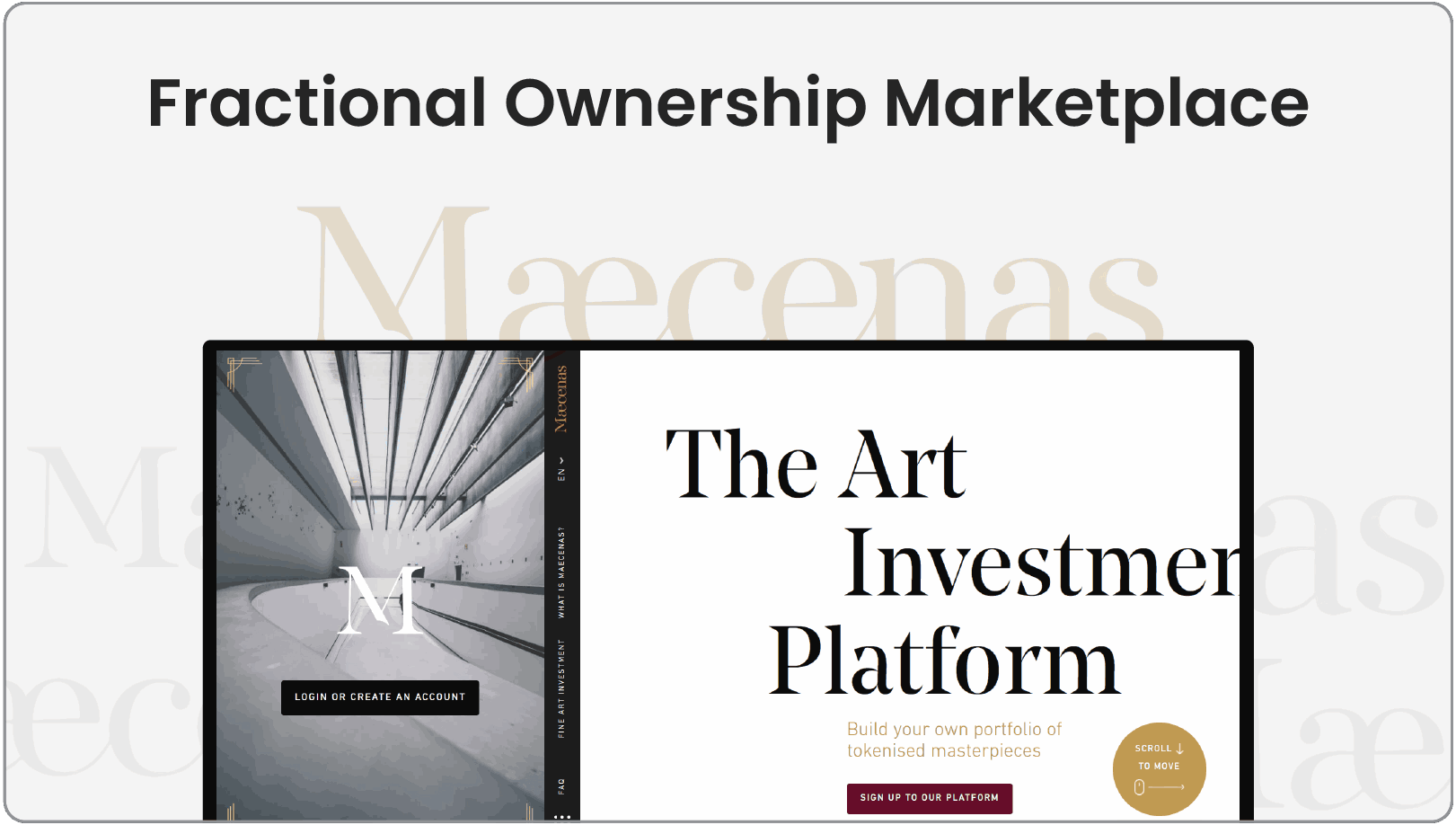
Fractional Ownership Marketplaces make NFTs more accessible to individual buyers by allowing numerous people to jointly own a portion of a single NFT. This can be especially helpful for expensive NFTs that may be out of the price range of most purchasers.
Several advantages distinguish fractional ownership platforms from other NFT marketplaces. In the first place, they increase the affordability and accessibility of NFT ownership. Expensive NFTs can be subdivided into smaller, more affordable portions, thereby expanding ownership opportunities to a broader audience.
In addition, fractional ownership platforms allow users to invest in NFTs without having to assume the full risk of ownership. By owning a fraction of an NFT, users can still profit from any prospective increase in value while minimising their exposure to loss.
In contrast, fractional proprietorship NFT marketplaces have disadvantages as well. For instance, they may not provide the same level of ownership rights and control as a full NFT. Moreover, the process of purchasing and selling fractions of NFTs can be more complex than buying an asset in its entirety.
In general, fractional ownership NFT marketplaces offer users an innovative and convenient method to invest in NFTs. While they have some disadvantages, their affordability and risk management advantages make them a compelling choice for many investors.
Eg: Maecenas –
Maecenas is a platform that provides fractional possession of works of art. For instance, in 2018, they partnered with the London-based Dadiani Fine Art gallery to sell fractional ownership of an Andy Warhol painting. Through a blockchain-based auction, different investors could acquire ownership of the same painting and receive a digital certificate of ownership in the form of an NFT.
Comparison Between Hybrid & Fractional Ownership Marketplace
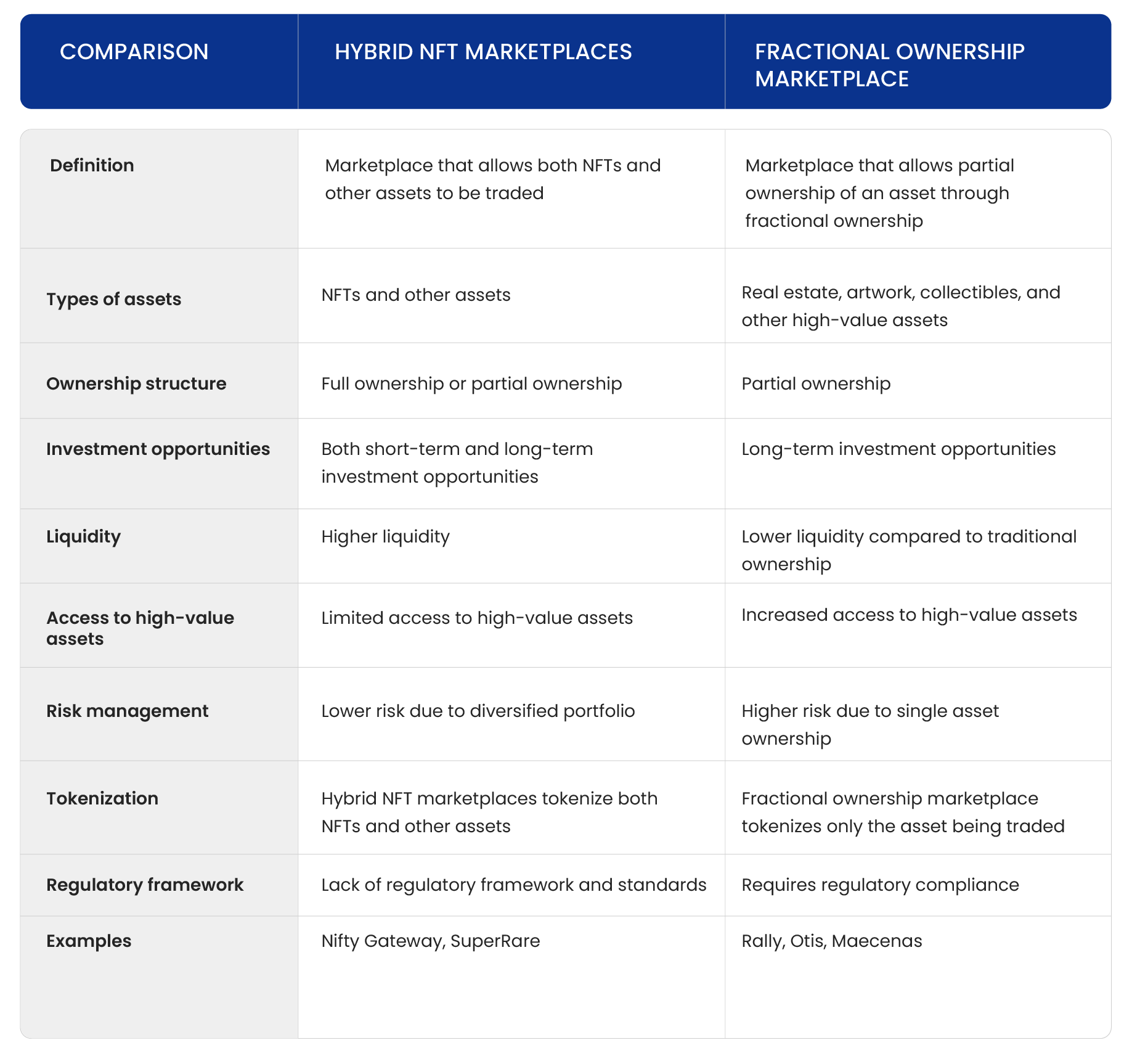
5. Auction NFT marketplace
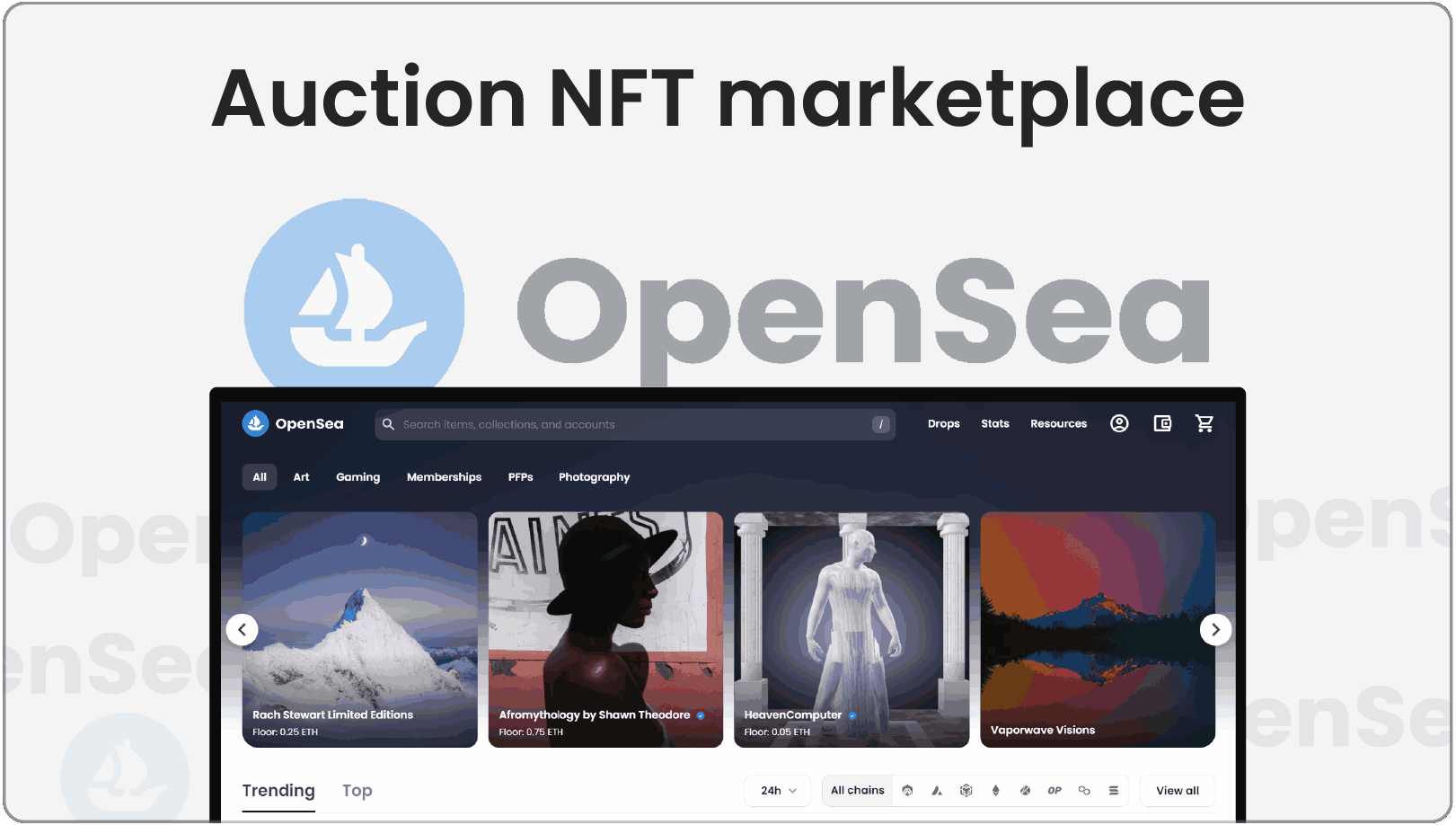
An auction NFT marketplace is a platform for the sale of non-fungible tokens (NFTs) via a bidding procedure. Auction marketplaces enable buyers to bid on NFTs, with the highest bidder winning the item.They oftenly draw investors and collectors searching for rare and valuable NFTs.
These marketplaces provide both buyers and vendors with a transparent and equitable process. A seller’s reserve price is the lowest price at which they are willing to trade their NFT. If the reserve price is not reached, the NFT will not be offered for sale. This allows sellers to ensure that they receive a fair price for their NFT while also allowing buyers to negotiate a reduced price.
Auction NFT marketplaces also generate a sense of competition and enthusiasm surrounding the sale of NFTs, which can result in higher selling prices. If they believe they have outbid others and won the auction, buyers may be willing to pay more for an NFT.
NFT Marketplace App @ $5000

Eg: OpenSea –
is an example of an auction NFT marketplace. These marketplaces offer a variety of NFTs, including artwork, collectibles, and virtual real estate, for sale. In addition, they provide sellers with the means to create and list their NFTs for auction, including the ability to establish a reserve price, duration, and minimum bid increments.
Overall, auction NFT marketplaces offer a dynamic and engaging way to purchase and sell NFTs while also providing buyers and sellers with transparency and fairness.
Explore our other insights!
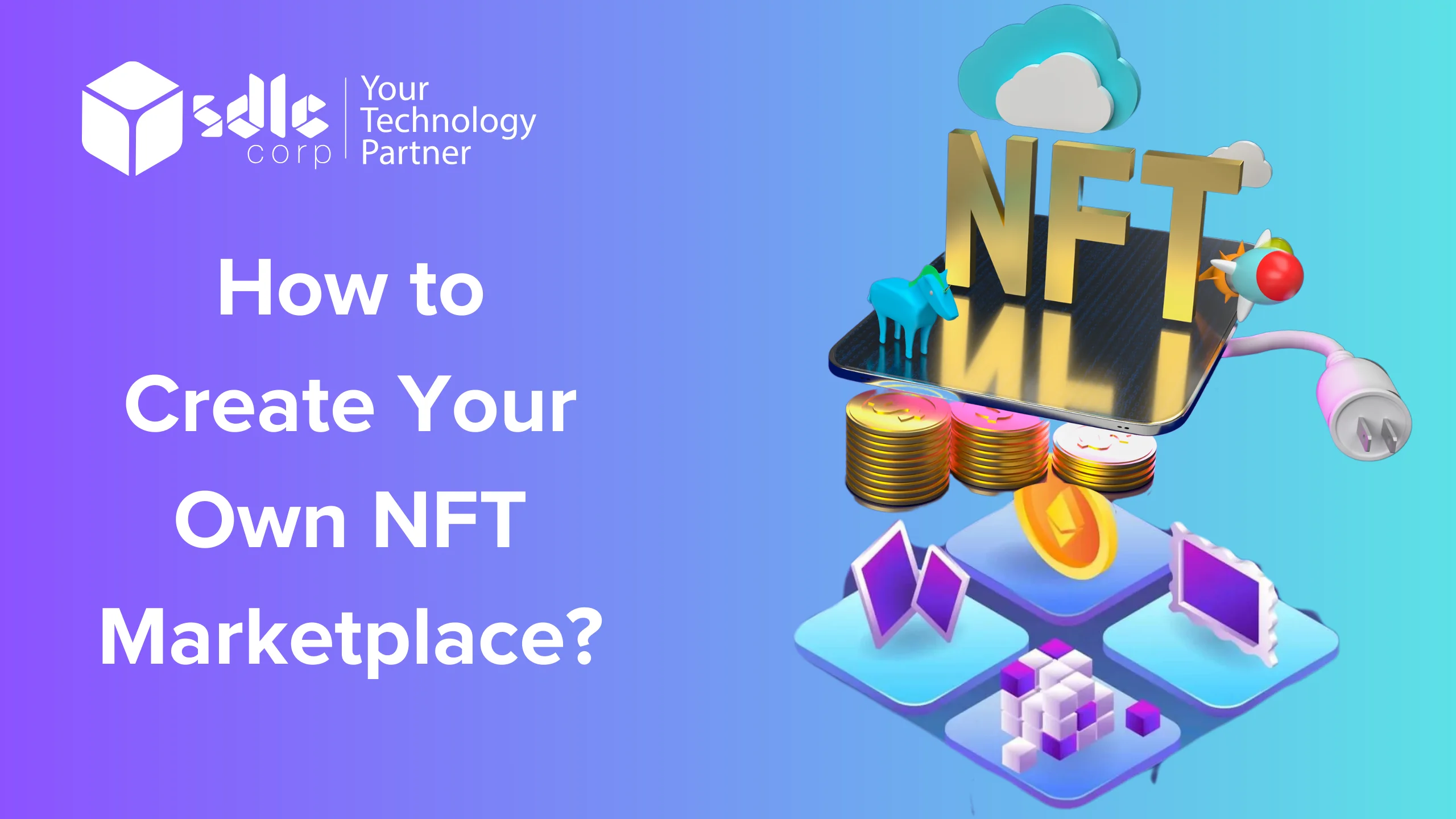
How to Create Your Own NFT Marketplace?
The rise of NFTs (Non-Fungible Tokens) has transformed the way digital assets are bought, sold, and owned. From
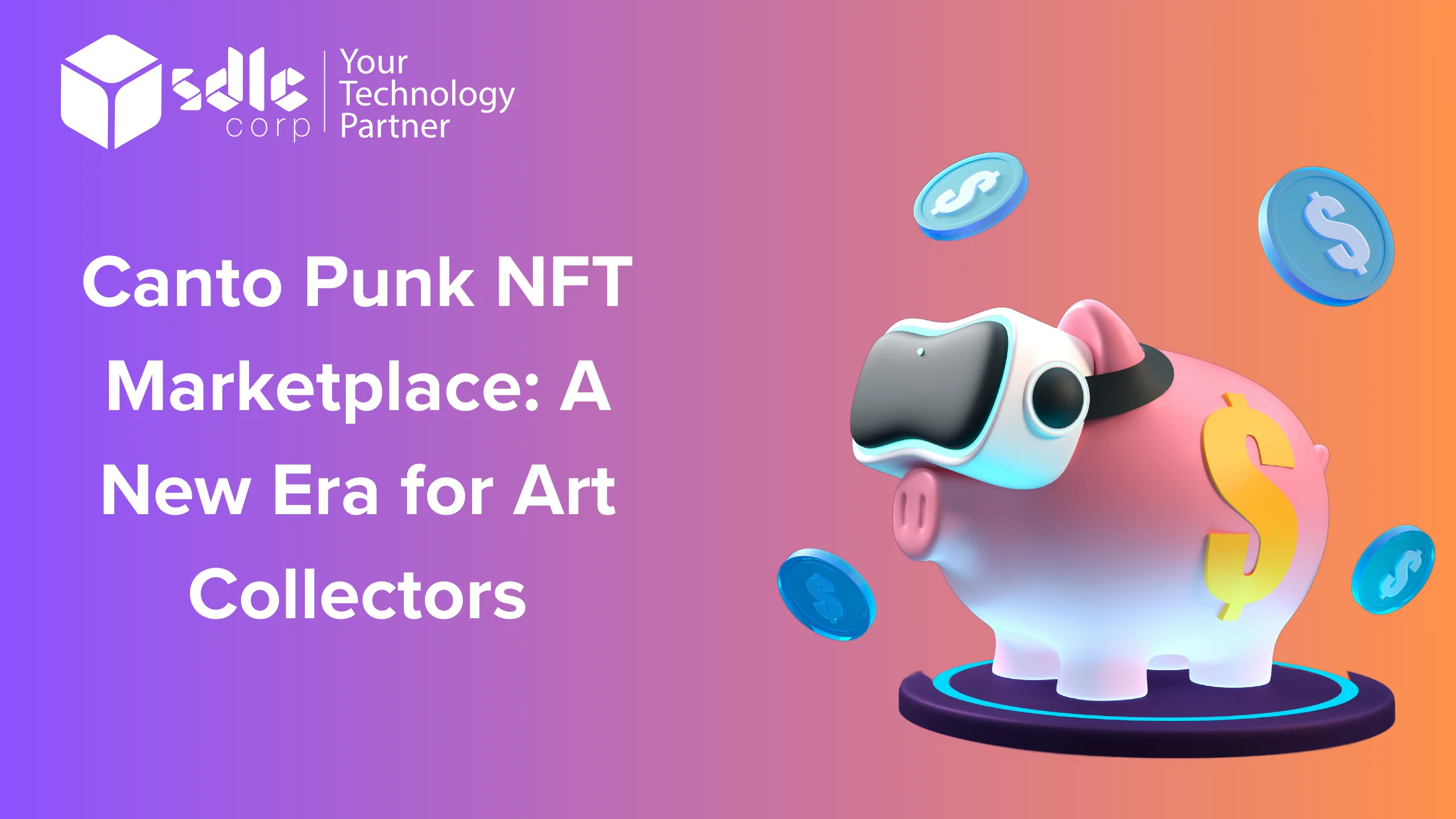
Canto Punk NFT Marketplace: A New Era for Art Collectors
Canto Punk NFT Marketplaces: A New Era for Art Collectors In recent years, Non-Fungible Tokens (NFTs) have been
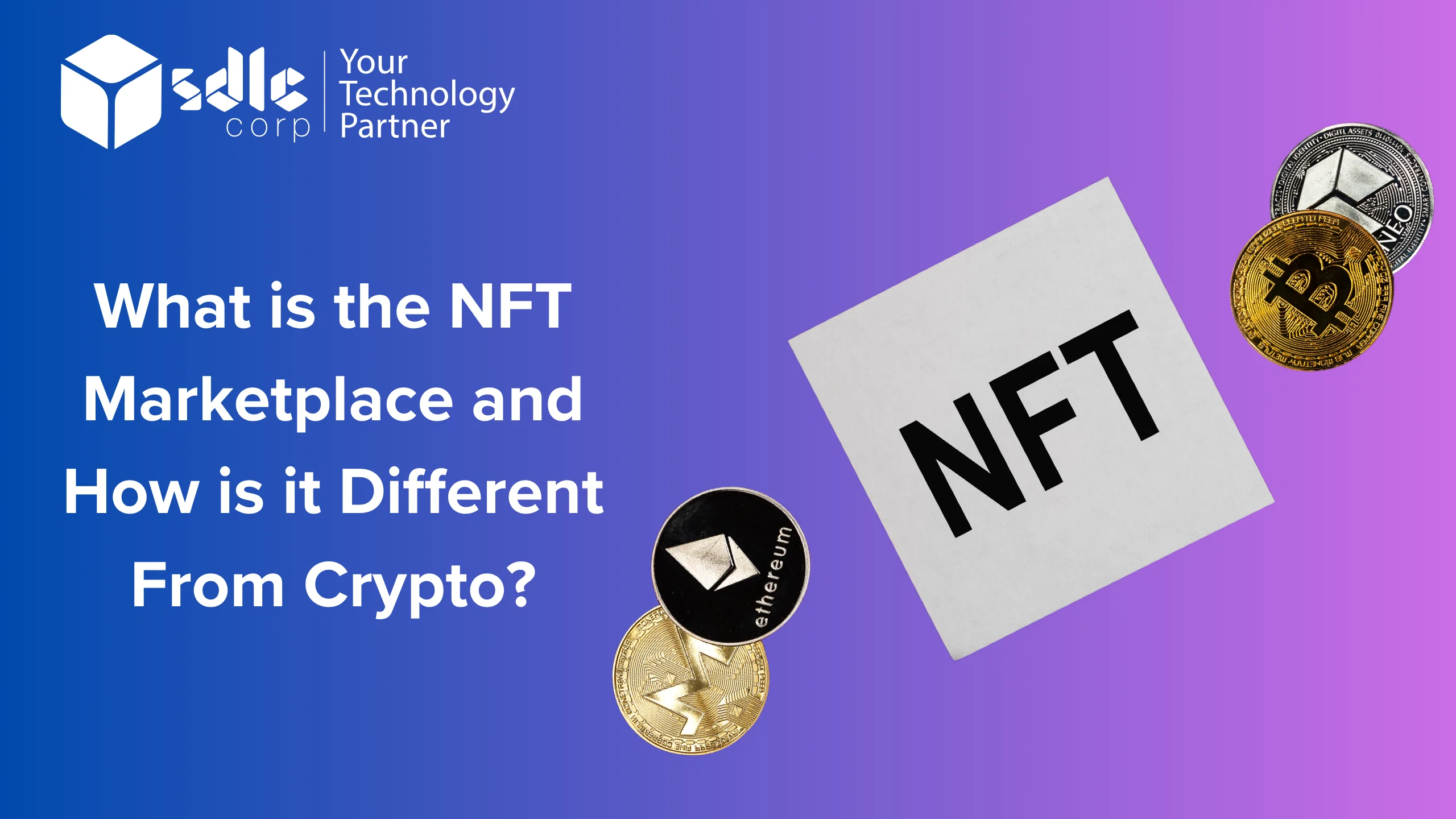
What is the NFT Marketplace and How is it Different From Crypto?
Introduction The NFT marketplace is a digital platform where users can buy, sell, and trade unique digital assets,
6. Social NFT Marketplaces
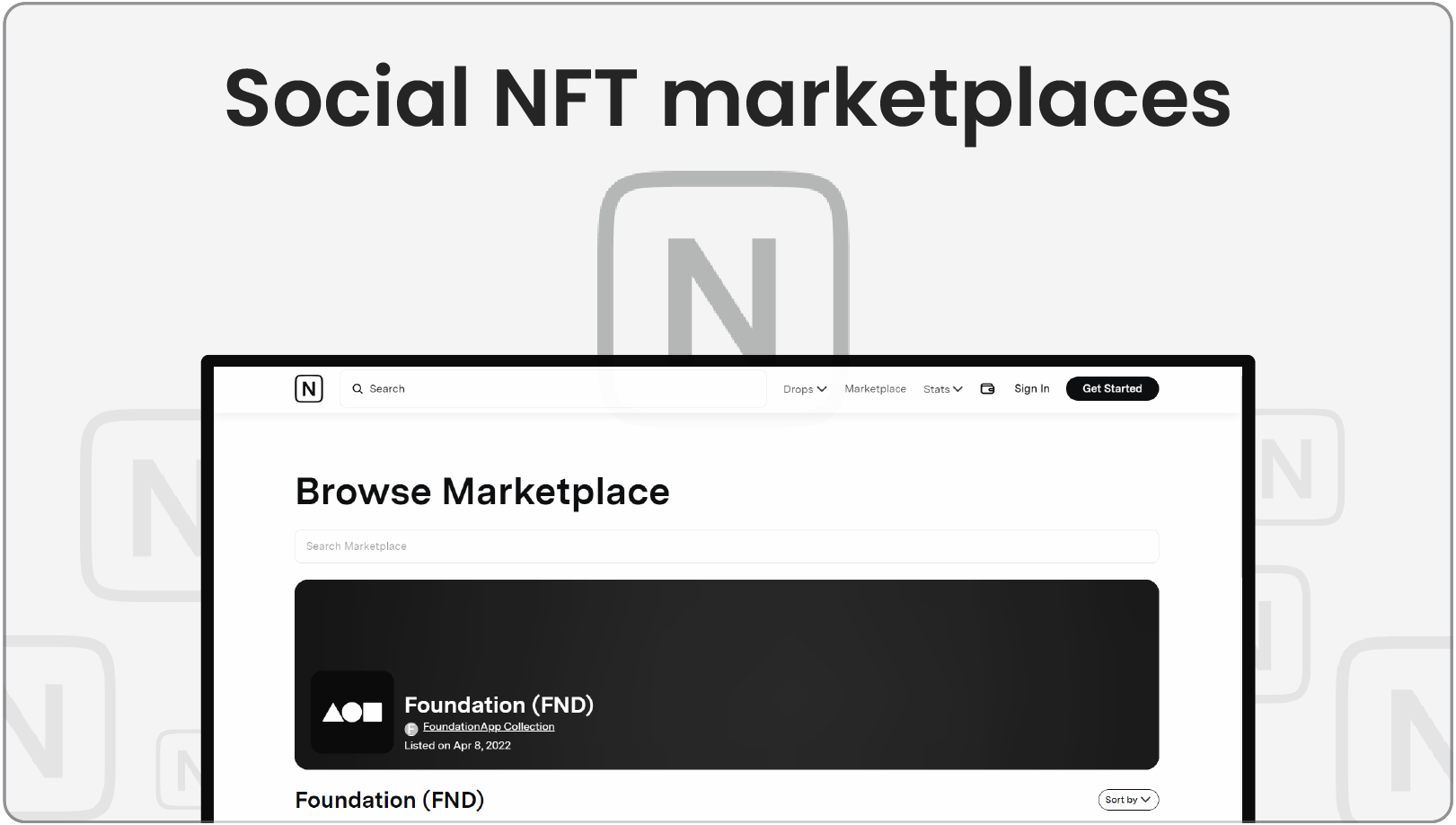
Social NFT marketplaces permit creators to mint and sell their own NFTs directly to their audience. These marketplaces allow creators to monetize their work while also developing a brand-based community.
The capability to create personalised tokens is a key feature of social NFT marketplaces. Creators can design NFTs that are unique to their brand and provide their audience with exclusive benefits. For instance, a musician could establish an NFT that grants holders access to exclusive backstage passes or a limited-edition merchandise line. These tokens can also be used to reward community participation, such as social media favourites and shares.
Social NFT markets also allow creators to retain ownership and control over their work. By minting and selling their own NFTs, creators can ensure they receive an equitable portion of their work’s profits. This is particularly vital for independent creators who may not have the backing of a larger corporation.
Eg: Foundation and Nifty Gateway –
are two social NFT marketplace examples. These marketplaces sell a range of non-fungible tokens, including artwork, music, and collectibles. In addition, they provide creators with tools to design and mint their own NFTs, as well as buyers with tools to peruse and purchase tokens.
Overall, social NFT marketplaces provide a means for creators to monetize their work while simultaneously developing a brand-centric community. By providing personalised credentials and rewards for community engagement, these marketplaces offer a novel and engaging way to buy and sell NFTs.
NFT Launchpad Software just @ $5000

7. Gaming NFT Marketplaces
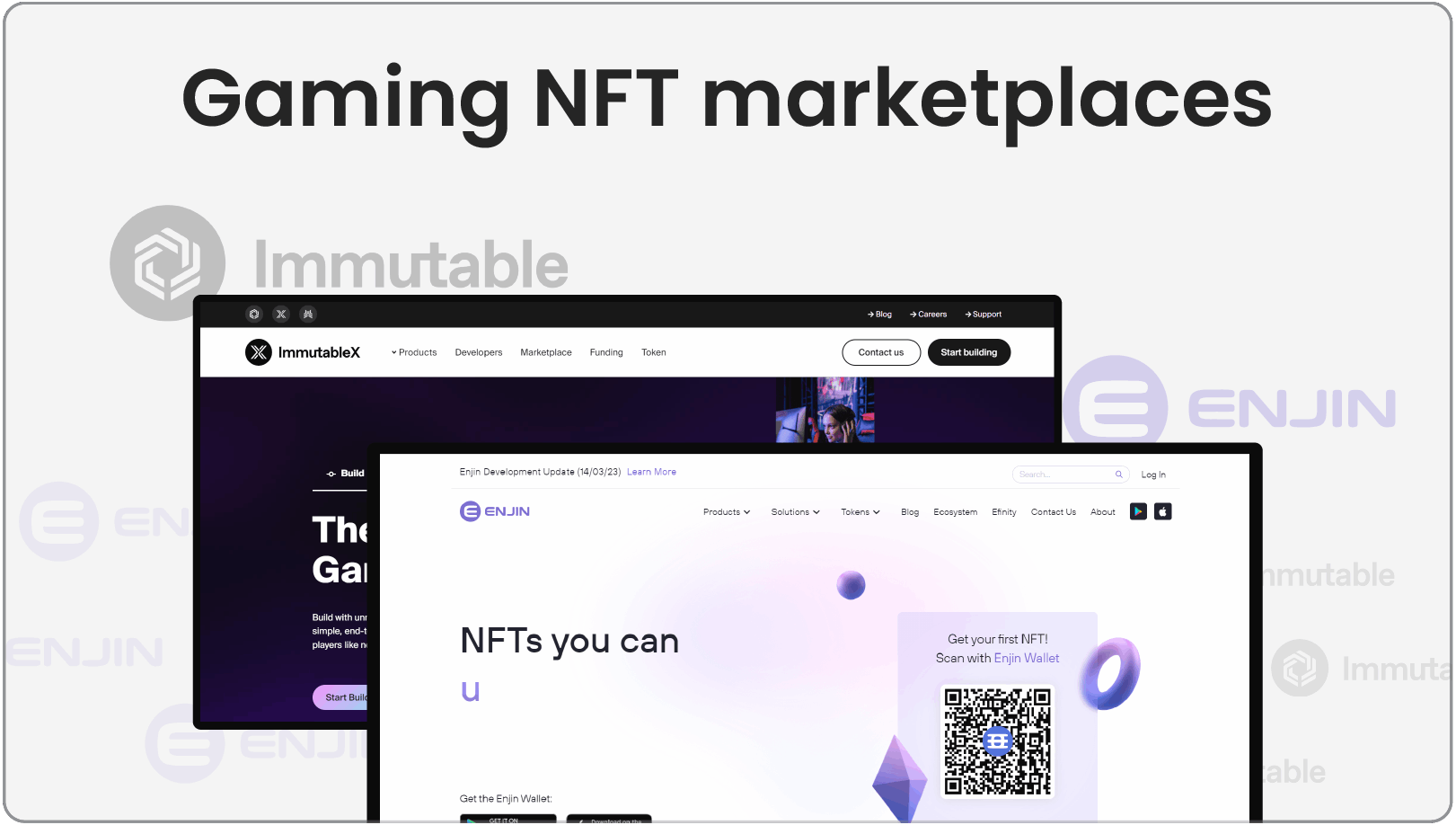
Gaming NFT marketplaces are platforms for buying, selling, and trading in-game assets as NFTs. These marketplaces provide gamers with complete ownership and control over their virtual products. The rise of blockchain technology, which enables the creation of unique and verifiable digital assets, has contributed to the popularity of gaming NFT marketplaces.
The ability to barter in-game assets as NFTs is a major element of gaming NFT marketplaces. This facilitates the purchase and sale of assets on a secure and transparent platform. These assets can range from in-game currency to unique, quest- or event-exclusive items.
Gaming NFT marketplaces also provide a method for players to earn money through gameplay. By acquiring rare items or in-game currency, players can profit by selling them on NFT marketplaces. This can be particularly appealing to avid gamers who have accumulated valuable assets while playing their favoured games.
Eg: Immutable X and Enjin –
are some examples of gaming NFT marketplaces. These marketplaces offer a variety of gaming assets for sale, as well as the means to mint and trade one’s own.
Gaming NFT marketplaces allow gamers to genuinely own and control their virtual assets. These marketplaces offer a unique and exciting opportunity for gamers to earn money through their gameplay by establishing a secure and transparent platform for purchasing and selling assets.
Comparison Between Social NFT Marketplaces & Gaming NFT Marketplaces
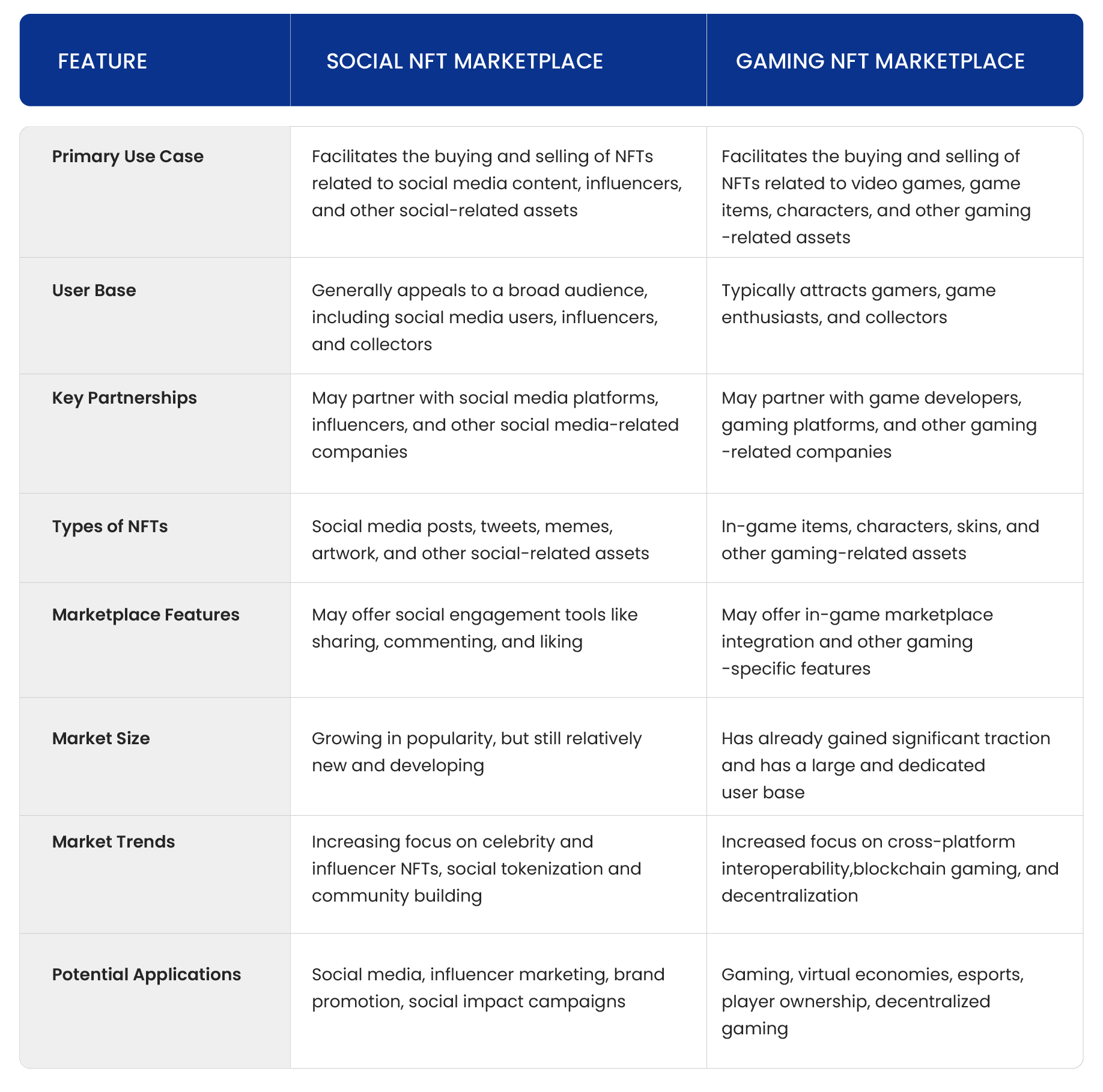
Conclusion
In conclusion, NFT marketplaces have evolved to accommodate various assets and use cases, including social media content, gaming assets, and artwork. Social and gaming NFT marketplaces have unique features, audiences, and effects on available NFTs. As the popularity of non-fungible tokens (NFTs) continues to rise, we can anticipate additional market development and innovation, expanding the opportunities and applications of NFTs.
NFT Services by SDLC CORP
SDLC CORP specializes in a variety of NFT services, leveraging blockchain technology to empower your NFT projects and initiatives.
Explore our NFT services:
- NFT Token Development Company
- NFT Wallet Development Company
- NFT Staking Platform Services
- NFT Development
- NFT Launchpad Development Company
- NFT Consulting Services
- NFT Marketing Company
- NFT Metaverse Launchpad Development
- NFT Website Development Company
- Solana NFT Marketplace Development Company
- NFT Marketplace Development
Partner with SDLC CORP to unlock the potential of NFTs and transform your digital assets into valuable tokens on the blockchain.
FAQs
1. What is a social NFT marketplace?
A social NFT marketplace is a platform for purchasing and selling NFTs associated with social media content, influencers, and other social-related assets.
2. What is a gaming NFT marketplace?
A gaming NFT marketplace is a platform for purchasing and selling non-fungible tokens related to video games, game items, characters, and other gaming-related assets.
3. What types of NFTs are typically offered on social NFT marketplaces?
Social NFT marketplaces may provide NFTs associated with social media posts, tweets, parodies, artwork, and other social-related assets.
4. What types of NFTs are typically offered on gaming NFT marketplaces?
Gaming NFT marketplaces may provide in-game objects, characters, skins, and other gaming-related assets as NFTs.
5. How do social and gaming NFT marketplaces differ in terms of audience?
Social NFT marketplaces appeal to a wide range of individuals, including social media consumers, influencers, and collectors. Gaming NFT marketplaces, on the other hand, typically attract gamers, game enthusiasts, and aficionados.

